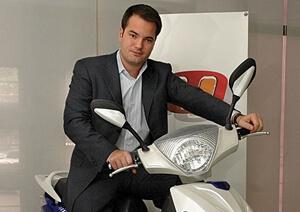Lined up at the stoplights, bikes often outnumber cars on Joe Bowman's five-mile commute to work from his London apartment. Bowman, UVM Class of 2001, is among the two-wheeled converts on the street, but he stands out from the crowd on his Ultra Motor A2B, an electric bicycle that he not only rides but champions as a guiding force of the company that makes it.
The vagaries of an oil economy and advance of global warming are great change motivators, and Bowman believes Ultra Motor is well-positioned to be a player as the world looks for cleaner, more efficient ways to move. At age thirty-three, Bowman is president of the multi-million dollar, multi-national Ultra Motor enterprise. It's his latest venture in a wunderkind, globetrotting career rooted in a place where teenagers unafraid to dream big often start — in a friend's basement with a couple of guitars and amps.
From their subterranean beginnings, Bowman and his band mates in Somah quickly built a following in the New York area during the early nineties. Several albums and the inevitable van touring followed as they built a fan base in the jam band scene. (Looking back, Bowman describes Somah's music as Radiohead meets Phish — "lots of long guitar and Hammond organ solos.")
"Being involved in music early teaches you a lot of things," Bowman says. "Responsibility and discipline on the one hand, and it also lets you get all that young angst out of your system, so when you want to get serious you know the value of the education and how much the tuition costs."
Somah relocated to Burlington in 1995. Not long after, the band members began to go their separate ways and Bowman came to feel he'd had enough of the romance of "living in a van with four guys who don't smell very good." When he enrolled at UVM, Bowman had thoughts of working internationally and quickly found his way to the study of Russian language and culture. Nearly from his first day on campus, Professor Kevin McKenna would prove to be a key influence on Bowman's future direction.
"Joe always had the good, sound sense to realize that while he was especially fascinated by the Russian language and its culture, he still understood that he would have to ground his language interests in a sound, practical skill that would enable him to pursue a long career following his education at UVM," says McKenna. Together, they mapped out course schedules that mixed Russian language and literature with studies in economics, business administration, and accounting. McKenna adds that Bowman quickly "distinguished himself in these programs as much as he had done so in our German and Russian Department."
Post-UVM, Bowman moved to Moscow where he initially worked with a private equity fund and became involved with investing in technology start-ups. Seeing the opportunity of venture capital in Russia, in 2003 Bowman and two partners established the first venture capital firm in the country. The start-ups they would back included Ultra Motor, a two-wheeler powered with a hyper-efficient motor developed by Russian Vasily Shkondin in the 1970s. Shkondin's motor produces 35 percent more torque from the same amount of power, key to Ultra Motor's line of affordable electric scooters.
Bowman stepped in as CEO of Ultra Motor during a management crisis in 2006 and remained in the role until this year. Under his leadership, the company has grown to more than three hundred employees and topped $30 million in revenues last year. In March, Bowman transitioned to president of the company, responsible for product and technology development, the European market, and strategic planning.
"The best companies are built on really simple ideas," Bowman says. "Ultra Motor recognized an opportunity based on a basic idea." That thought, to paraphrase Bowman, is this: spiking energy costs and rising awareness of climate change are creating a global shift in transportation. The car is no longer the one-stop shop.
Ultra Motor quickly sold more than 25,000 bikes in India. China is projected as another major potential market, and the company released their first bikes in the United States last year, opening 300 points of distribution in five months.
In Europe, Bowman has worked with cities to incorporate Ultra Motor bikes into innovative electric bicycle and car sharing programs. Though those projects are on hold due to the global recession, Bowman is hopeful they can return to those initiatives as the economic picture brightens. Ultra Motor's primary focus these days is the company's product business, which has Bowman busy preparing to enter new markets in the United Kingdom, Germany, and the Netherlands in the next six weeks.
Bowman has proven himself to be a savvy businessman, and in Ultra Motor he's selling a product that seems bound to make money and make a difference for the planet. He says, "As an educated adult who happened to get into the green tech industry, I find it's very natural and very rational behavior as both an entrepreneur and as a consumer to look at where the world is going and say, 'This has got to stop.'"
Editor's Note:
This article originally appeared in the winter 2009 issue of Vermont Quarterly Magazine. The full issue is available on-line at alumni.uvm.edu/vq. Print copies may be requested from University Communications, (802) 656-2005, or via e-mail, tweaver@uvm.edu.
